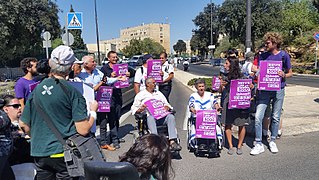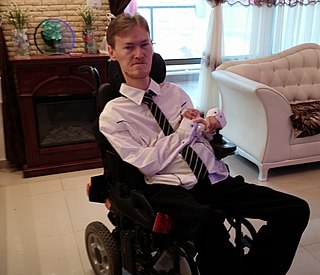Disability rights

About a fifth of Israel's population is affected by disability. The country is a state party of the UN Convention on the Rights of Persons with Disabilities. There is a system of legislation and policies that protect the rights of disabled Israelis.
In 2019, people with disabilities were 17% of the population of Israel. Adults from 18 to 64 years constituted 50% of the total, adults 65 years and older were 33%, and children 0–17 years old made up 17%. About 6% of working-age (20-64) people had significant difficulty with activities of daily living while some 10% had moderate disability. [1]

Israel signed the United Nations Convention on the Rights of Persons with Disabilities on 30 March 2007 and ratified it on 28 September 2012. [2]
The Equal Rights for Persons with Disabilities Law of 1998 was enacted to change previous welfare oriented legislation and social policies to a rights based regime in line with the social model of disability. The intent is to change the attitude towards people with disabilities and reducing the socioeconomic gaps between them and the rest of the population in the various spheres of life. This law and others also regulate disability pensions, accessibility, therapy, special education, sheltered workshops and assisted living. [3] [4] The Commission for Equal Rights of Persons with Disabilities was created in 2000 under the Ministry of Justice to oversee, promote and enforce disability rights legislation and policy. [5]
Since the beginning of the 21st century, disabled people in Israel, with a population of 250,000, [6] have managed to equalize the disability pension from the Bituah Leumi (National Insurance Institute of Israel) to the minimum wage level in Israel. In 2017, [7] activists protested the low disability pension by demonstrations, blocking main roads, highways and industries, activity in social networking services, petitions to the High Court of Justice, negotiations with the Government of Israel and bills in the Knesset.
In 2017, a full disability pension was 2,342 ILS. [8] The minimum wage in this year was 5,000 ILS, and in December 2017 it went up to 5,300 ILS per month. [9] [10] [11] [12] [13]
Israeli athletes have participated in every Summer Paralympic Games since 1960 and hosted the 1968 Paralympics in Tel Aviv. As of 2021 [update] Israel have never participated in the Winter Paralympics.
Disability is the experience of any condition that makes it more difficult for a person to do certain activities or have equitable access within a given society. Disabilities may be cognitive, developmental, intellectual, mental, physical, sensory, or a combination of multiple factors. Disabilities can be present from birth or can be acquired during a person's lifetime. Historically, disabilities have only been recognized based on a narrow set of criteria—however, disabilities are not binary and can be present in unique characteristics depending on the individual. A disability may be readily visible, or invisible in nature.

The Disability Discrimination Act 1995 is an Act of the Parliament of the United Kingdom which has now been repealed and replaced by the Equality Act 2010, except in Northern Ireland where the Act still applies. Formerly, it made it unlawful to discriminate against people in respect of their disabilities in relation to employment, the provision of goods and services, education and transport.
The disability rights movement is a global social movement that seeks to secure equal opportunities and equal rights for all people with disabilities.
A disability pension is a form of pension given to those people who are permanently or temporarily unable to work due to a disability.
The term sheltered workshop refers to an organization or environment that employs people with disabilities separately from others, usually with exemptions from labor standards, including but not limited to the absence of minimum wage requirements.

Social welfare has long been an important part of New Zealand society and a significant political issue. It is concerned with the provision by the state of benefits and services. Together with fiscal welfare and occupational welfare, it makes up the social policy of New Zealand. Social welfare is mostly funded through general taxation. Since the 1980s welfare has been provided on the basis of need; the exception is universal superannuation.

Ilan Gilon was an Israeli politician. He served as a member of the Knesset for the Meretz and the Democratic Union alliance in three spells between 1999 and 2021.

Bituah Leumi is Israel's national social security agency.
Nochi Dankner is an Israeli businessman and a board member of the Jewish Agency for Israel. He was the controlling shareholder of the IDB Group. Dankner is also the founder and chairman of the Ganden Group - which led him to personal bankruptcy of 400 Million NIS. In 2017 he was convicted of Securities Fraud for a scheme to inflate his company's stock price in order to raise money when it was struggling financially.
Disability in the United Kingdom covers a wide range of conditions and experiences, deeply impacting the lives of millions of people. Defined by the Equality Act 2010 as a physical or mental impairment with a substantial and long-term adverse effect on a person's ability to carry out normal day-to-day activities, it encompasses various aspects of life, including demographics, legislation, healthcare, employment, and culture. Despite numerous advancements in policy and social attitudes, individuals with disabilities often encounter unique challenges and disparities.

Dina Feldman is the second Israeli Commissioner for Equal Rights of Persons with Disabilities, an activist in the areas of human rights, women's equal opportunity, cross cultural, educational and interfaith dialogue, and in the preservation of the history of the Jews in Poland, before, during and after the Holocaust.
In Japan, a person with a disability is defined as: "a person whose daily life or life in society is substantially limited over the long term due to a physical disability or mental disability". Japan ratified the United Nations Convention on the Rights of Persons with Disabilities (CRPD) on 20 January 2014.
Pensions in Israel consist of a state old age pension system, a private pension system which employees are legally required to participate in and that is supervised and regulated by the government, and a pension system for civil servants.
Welfare in Israel refers to the series of social welfare schemes in the Israeli government which are administered by the Ministry of Social Affairs and Social Services, and by Israel's national social security agency, Bituah Leumi. All residents of Israel must pay insurance contributions in order to qualify for welfare.

Disability rights in Israel are based among the rest upon disability pensions, accessibility regulations, therapy, special education, sheltered workshop and assisted living.

Hannah Akiva is an Israeli social activist and a leader of "The Disabled Panthers", a group working towards getting a minimum wage in Israel, after paying social insurance throughout their years of work. "The Disabled Panthers" came from "The Organization for advancing the rights of the disabled people", a registered association since October 22, 2017. Akiva has been a disabled woman since her late twenties.

Alex Fridman is an Israeli disability rights activist, who founded the association Disabled, Not Half a Human Being, which aimed to raise the disability pensions in Israel.
As of 2011, 15.1% of people in Denmark had a basic activity disability, and 16.9% had an employment disability.

Israel Elwyn (IE) (Hebrew: אלווין ישראל) is an Israeli nonprofit organization that provides services and programs for people with intellectual and developmental disabilities. It serves over 5,100 people from all age groups. The goal of the organization is to create a society in which people with disabilities have equal rights and can determine their own future and way of life. With the help of its programs, children and adults with disabilities gain the tools needed to lead more independent lives within the community.

Disabled, Not Half a Human Being is an Israeli Non-governmental organization which works for the rights of people with disabilities in the State of Israel. Its main goals are raising the general disability allowance and equalizing it to the minimum wage, advancing the issue of accessibility, advancing the right to housing for disabled people, nursing, proper medical treatment and integration of people with disabilities into society and employment.